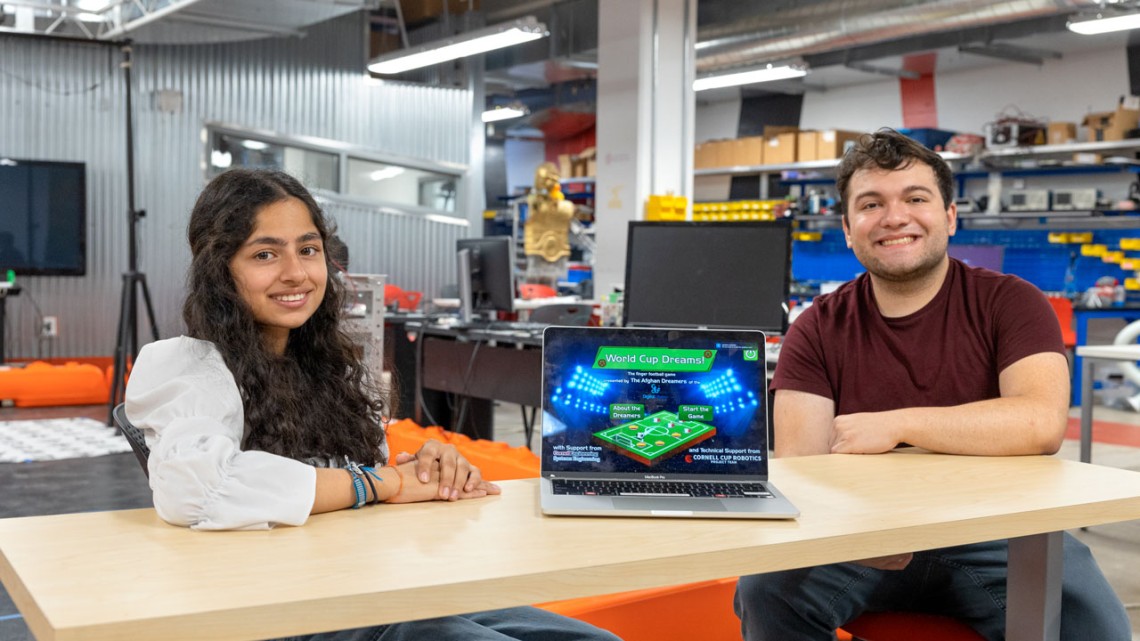
Aditi Vishwanath ’24, left, and Corbin Stickley ’24 of Cornell Cup Robotics are pictured in their Carpenter Hall lab with the video game, World Cup Dreams, that they helped develop along with the Afghan Dreamers, an all-girls robotics team. The game is expected to be promoted at the FIFA World Cup, which begins Nov. 20 in Qatar.
Afghan Dreamers, Cornell Cup Robotics launch World Cup Dreams
By Tom Fleischman, Cornell Chronicle
The world’s biggest soccer tournament begins Nov. 20 in Qatar, and Cornell Engineering is partnering with the Afghan Dreamers all-girls robotics team in an effort to harness this energy – and inspire young people to dream big, in both soccer and STEM learning.
The Afghan Dreamers have been working with Cornell Cup Robotics (CCR) to develop a soccer video game inspired by the 2022 FIFA World Cup tournament events in Qatar. The tournament will conclude on Dec. 18.
The star of this “finger soccer” game is an artificial intelligence designed by the Dreamers themselves, and implemented in the game with help from Cornell Cup Robotics. Plans are for the game, “World Cup Dreams,” to be available for free download on an associated website.
“We’re really honored to be a part of the empowerment experience for the girls, and helping to spread their message and their story is part of it,” said David Schneider, M.S. ’05, Ph.D. ’07, professor of practice in systems engineering in the College of Engineering and CCR faculty adviser. “I think it really does fit within the broader Cornell mission of ‘doing the greatest good.’”
Students in CCR, a project team in Cornell Systems Engineering, have been working with the Afghan Dreamers, founded in 2017 by the Digital Citizen Fund, for more than a year. Many of the girls were displaced from their native Afghanistan, to Qatar and other countries in the region, in 2021 following the Taliban takeover and U.S. military withdrawal.
Earlier this year, CCR invited the Afghan Dreamers to develop a feature for C1C0 (pronounced KEE-ko), an R2D2-inspired robot and the Cornell team’s official spokes-droid. Their latest collaboration has resulted in the video game.
“That was part of the draw to the project for me,” said CCR member Corbin Stickley ’24, a computer science major and co-developer of the game. “I’m doing it as part of Cornell Cup Robotics team, but I immediately thought the project was for a really good cause. I thought that made it more worthwhile and even more interesting, so I was excited to give the girls the opportunity to implement an AI that they designed.”
The CCR team developed the game using the Unity game engine and Unity Asset Store and finalboss Games assets. The game features five players – called “pucks” due to their shape – per side, with the idea being to maneuver your players toward the opposing goal and shoot the ball past the defense. There is no goalkeeper; the team that scores the most in three minutes is the winner.
Players can compete against any of the 32 World Cup teams, as well as the Afghan Dreamers squad, which is uniquely powered by the artificial intelligence they designed.
“It’s been great working with the girls,” Schneider said. “And it definitely mirrors a real-world scenario, where we have different development groups in different parts of the world, different countries with different cultures, and how we actually work together on a project.”
Stickley said the Afghan Dreamers’ contribution involves enhanced game play for their own team. The key enhancement: If the opponent gets the ball behind all five of the Dreamers’ pucks, one of the pucks will drop back between the ball and the goal, to block a potential shot.
“That’s a pretty unique feature; it’s actually really hard to get around that sometimes,” Stickley said. “I found it fairly difficult to beat their AI when I was play testing against it.”
“I really like the fact that the Afghan Dreamers were able to have their own AI implemented in the game,” said Aditi Vishwanath ’24, a computer science major and member of CCR’s business and communications sub-team. “And their AI is a drastic improvement from the actual AI on the asset.”
Schneider hopes their story will resonate with young people around the world, particularly in less-advantaged countries.
“We hope this might be empowering for young girls,” Schneider said. “There could be a young girl in Cambodia who could download this game for free on a phone. She could read the small blurb about the Dreamers and maybe, just maybe, be a little bit more inspired to dream what she could make happen too.”
Media Contact
Get Cornell news delivered right to your inbox.
Subscribe
